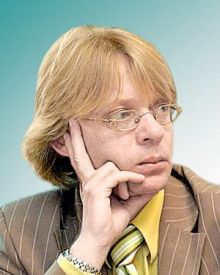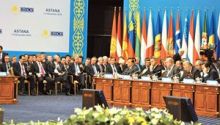It seems that only indolent observers did not notice that the OSCE summit in Astana at the beginning of December was a quasi-failure. It has been reported that even the final declaration took 10 hours to be adopted, instead of the one and a half hours planned, and all the meetings were held in a tense atmosphere because of the participants’ intransigence on one or another question. In my opinion, there was a certain deja vu: one could say the time machine brought everybody back to the previous summit, held 11 years ago in Istanbul. Then Boris Yeltsin clinched with Bill Clinton and his West European associates. ‘You have no right to criticize Russia for Chechnya!’ – the seriously ill Russian leader couldn’t and didn’t want to hide his anger. The German chancellor and future “Gazprom employee” asserted the impossibility of bombarding civilians and Yeltsin recalled the recent bombing of Yugoslavia. Not just rumors, but the “couloir report” of Russian officials affirmed that Yeltsin would leave the summit without signing the final documents – the Istanbul Declaration, the Safety Charter and the adapted version of the Treaty on Conventional Forces in Europe. They were in limbo until the end of the summit, and the signing was postponed for a day. Journalists started writing about the beginning of a new “cold war”…
During the next 10 years none of the countries that presided the OSCE declared any ambitions to breathe a new life into this organization and it was slowly falling apart. Moreover, new projects of regional organizations were initiated. And only few would have noticed that Astana took over the leadership if it hadn’t declared its intention to reanimate the organization, born in Helsinki in 1975.
“Kazakhstan presided over the OSCE in its hardest times, when it was in need for new ideas and radical restructuring,” rightly pointed Amangeldy Zhumabayev, the Kazakh Ambassador to Ukraine. “Our presidency of the OSCE coincided with the Kyrgyz crisis and Kazakhstan had to deal with this issue. It is due to the efforts of President Nazarbayev that a civil war in this country was prevented. Our country worked on the so-called frozen conflicts, particularly the one in Nagorno-Karabakh. The fact that Transnistria opened the corridor to Chisinau and Odesa is also the result of the OSCE head’s difficult work. Kazakhstan started actively developing a non-military aid program for Afghanistan. Only this year our government has allocated 1.5 million dollars for the construction of hospitals, schools and roads there, and 50 million dollars will be spent on giving Afghan youths a chance to study in Kazakh high schools.”
It should be noted that the participants of the summit in Astana didn’t resolve any of the existing problems. Russia categorically rejected even to recognize “the conflict with Georgia,” Azerbaijan and Armenia exchanged intransigent claims about Nagorno-Karabakh. Despite all this, opines the Ambassador Zhumabayev, the participants managed to keep to all the principle documents of the organization, which matters a lot, considering the circumstances: “Having adopted the Astana Declaration, we all confirmed the OSCE’s obligations, principles and values enshrined in the Helsinki Act and the Paris Charter for a New Europe, and other documents of the organization.”
And, of course, Kazakhstan itself gained, having used the year to strengthen its role on the international arena. Primarily, Astana managed to enforce the concepts “from the Atlantic to the Urals” and the “Eurasian dimension” in the European context. It is known that Kazakhstan has its own project for regional cooperation, enshrined in “The Conference on Cooperation and the Confidence-Building Measures in Asia.” Initiated as a conference in the 1990s, in 2002 this structure was formalized as an international organization with a permanent secretariat. Each state-participant coordinates the direction which is closest to its interests. For example, India supervises the energy security and the transport corridors. Currently this organization embraces 20 countries, including Russia, China, India, Pakistan, and Turkey, and more are set to join. Astana also actively encourages Ukraine to join. Who knows, in better conditions, the summit might bring together the Iranian president and Western leaders.
Because of the desperate sighs the news about an agreement between Germany, Russia, Belarus, Kazakhstan and China to open the Eurasian railway corridor went almost unnoticed. This idea isn’t new as it was first discussed nine years ago, but today the participants already guarantee its realization. Kazakhstan has been actively developing its part of this project. “Ukrainian business now has a good opportunity to join the industrial and innovative development program,” emphasizes the Kazakhstan Ambassador to Ukraine. “Particularly, to join the transit transport corridor from Western Europe to western China. The route is 8,400 kilometers long, 2,700 kilometers of which will pass through Kazakh territory. Transport is the main dimension in the development of intergovernmental relations.”
Kazakhstan passed the OSCE presidency baton on to Lithuania. The country’s President Dalia Gribauskaite has already voiced the priorities of Lithuania’s presidency: resolving “frozen conflicts,” human rights, free elections and fighting against cybercrime. We will soon see how ambitious Vilnius is, as a year is a short period of time. Then Kyiv will wade in, and it will really need Astana’s expertise and advice, the more so that President Viktor Yanukovych claimed in his summit speech that Ukraine is going to play a major role.








